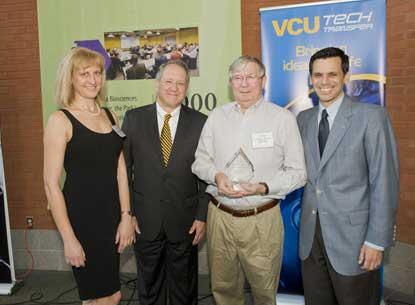
Oct. 30, 2012
VCU Celebrates its Inventors at 7th Annual Reception
Biochemistry Professor honored with Billy R. Martin Award for Innovation
Share this story
Swamp fever. Sounds like something you’d never want to get. Thankfully, it’s a virus that doesn’t affect humans. But it is a nasty virus for horses. Equine infectious anemia (EIA), often called swamp fever, is a contagious disease affecting the world’s horse population. EIA is caused by a virus similar to HIV in humans and leads to chronic disease for which there are no treatments. Infected horses are either euthanized or under strict lifelong quarantine.
For many years, the only test available to diagnose EIA in horses was the Coggins Test, developed 25 years ago by veterinary researcher Leroy Coggins. But the results take time (24 to 48 hours) and are often difficult to read. Now available on the market, a new rapid test can produce results in 15 to 30 minutes that are easier to read. This test was invented at Virginia Commonwealth University.
Darrell Peterson, Ph.D., professor, in the Department of Biochemistry and Molecular Biology, invented the test kit for EIA that produces much faster results, the SA-ELISA II test. The diagnosis for infection relies on detecting antibodies to the virus in the serum of the horse. The test developed in Peterson’s lab uses a procedure called an enzyme-linked immunosorbant essay (ELISA). Developing the test involved using recombinant DNA methods to make the necessary reagents for the test.
Peterson was honored with the Billy R. Martin Award for Innovation during the 7th annual Invented at VCU reception on Oct. 25. Billy Martin, Ph.D., who died in 2008, was the former chair of the Department of Pharmacology and Toxicology and internationally renowned for his research in understanding addition and drugs of abuse and how they affected the brain.
“I consider this a very big honor,” said Peterson. “There are a lot of really bright faculty members here at VCU doing incredible research and coming up with exciting inventions, so to be singled out as the Inventor of the Year is quite an ego boost. And of course, receiving an award named after Billy Martin, and thereby being in some way compared to him, is also a great compliment.”
VCU Tech Transfer, which hosted the reception, fosters a culture of innovation at the university and helps inventors to protect and commercialize their inventions. VCU researchers created more than 110 inventions last year.
“2012 was another record year in the number of invention disclosures and patent filings for VCU,” said Ivelina Metcheva, Ph.D, executive director of VCU Tech Transfer, Enterprise and Economic Development. “I am also pleased to report that our licensing revenues went up by 50 percent. During the past year, we’ve broadened our mission and reach of supporting entrepreneurship, invention creations and economic development, and our efforts have started to pay off.”
Economic development, including commercialization and licensing of inventions, is a major priority for the university.
“We want to enhance innovation and entrepreneurship, and this begins with our faculty,” said Francis Macrina, Ph.D., vice president for research at VCU. “We have a redoubled focus on economic development through the support and leadership of President Rao. The community of Richmond and the region now know we are the portal for economic development at VCU.”
With its objective to help VCU inventions move into the marketplace, Tech Transfer has also expanded its role in building and strengthening partnerships with business and funding communities.
“The SA-ELISA II project came about because VCU has a policy that encourages collaboration between faculty and potential industry partners,” said Peterson. “It was my chairman that led to the initial contact. And although I knew immediately that I could do the science, if it weren’t for VCU Tech Transfer, it would never have resulted in a completed project that is beneficial to the company, the university and myself.”
Research universities have become more and more important in advancing research and innovation in the United States.
“Universities like Virginia Commonwealth University conduct more than half of the scientific research in America,” said Michael Rao, Ph.D., president of VCU. “We are strengthening national security, improving access to health care and improving the quality of health care in very significant ways. We’re also advancing alternative energy and efficiency technologies, we’re fueling economic growth and job creation in ways that are really immeasurable.”
Subscribe to the weekly VCU News email newsletter at http://newsletter.news.vcu.edu/ and receive a selection of stories, videos, photos, news clips and event listings in your inbox every Thursday.
Subscribe to VCU News
Subscribe to VCU News at newsletter.vcu.edu and receive a selection of stories, videos, photos, news clips and event listings in your inbox.









